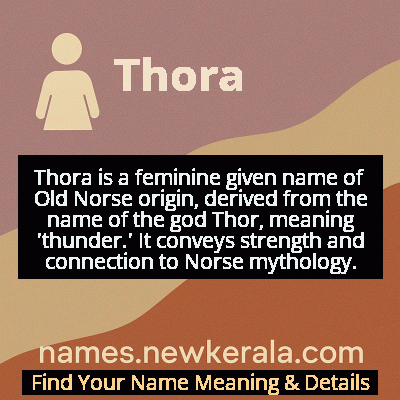Thora Name Meaning & Details
Origin, Popularity, Numerology Analysis & Name Meaning of Thora
Discover the origin, meaning, and cultural significance of the name THORA. Delve into its historical roots and explore the lasting impact it has had on communities and traditions.
Name
Thora
Gender
Female
Origin
Danish
Lucky Number
8
Meaning of the Name - Thora
Thora is a feminine given name of Old Norse origin, derived from the name of the god Thor, meaning 'thunder.' It conveys strength and connection to Norse mythology.
Thora - Complete Numerology Analysis
Your Numerology Number
Based on Pythagorean Numerology System
Ruling Planet
Saturn
Positive Nature
Ambitious, efficient, realistic, and authoritative.
Negative Traits
Materialistic, stressed, confrontational, and can be overly ambitious.
Lucky Colours
Dark blue, black.
Lucky Days
Saturday.
Lucky Stones
Blue sapphire, amethyst.
Harmony Numbers
2, 4, 6.
Best Suited Professions
Business leaders, managers, financial services, law enforcement.
What People Like About You
Leadership, determination, organizational skills.
Famous People Named Thora
Thora Birch
Actress
Acclaimed for her roles in 'American Beauty' and 'Ghost World', earning multiple award nominations
Thora Hird
Actress
Legendary British actress with over 100 film and TV credits, awarded Dame Commander of the Order of the British Empire
Thora Storm
Poet
Norwegian poet known for her romantic works and contributions to Scandinavian literature
Thora van Deken
Literary Character
Character in Hans Christian Andersen's fairy tales, representing traditional folklore figures
Name Variations & International Equivalents
Click on blue names to explore their detailed meanings. Gray names with will be available soon.
Cultural & Historical Significance
Extended Personality Analysis
Individuals named Thora are typically associated with strength, resilience, and natural leadership qualities. The thunder etymology suggests a personality that combines power with emotional depth—capable of dramatic presence yet fundamentally life-giving. Thoras often exhibit practical intelligence and problem-solving abilities, approaching challenges with both creativity and determination. Their strength is frequently balanced by strong protective instincts toward loved ones, mirroring Thor's role as protector of both gods and humans in Norse mythology. Socially, they tend to be authentic and straightforward, valuing honesty and loyalty in relationships. The name also suggests someone comfortable with both tradition and innovation—able to honor heritage while embracing progress. Many Thoras display a connection to nature and natural cycles, often finding peace in outdoor environments. Their emotional landscape is typically characterized by deep convictions and the courage to defend them, combined with a capacity for great warmth and nurturing toward those they care about.
Modern Usage & Popularity
Thora maintains a distinctive presence in modern naming trends, particularly appealing to parents seeking names with historical depth and strong feminine energy. In Scandinavia, the name enjoys consistent moderate usage, often appearing in birth registries in Denmark, Norway, and Sweden. Internationally, Thora has gained visibility through celebrity associations and appears more frequently in countries with strong Scandinavian diaspora communities. The name's popularity has been subtly boosted by the Marvel Cinematic Universe's Thor franchise, though it remains uncommon enough to feel unique. Current naming trends favoring mythological and nature-inspired names position Thora well for continued relevance. In English-speaking countries, it's often chosen by parents wanting a name that's both unusual and easily pronounceable, with strong cultural credentials. Social media analysis shows growing interest in Thor-related names, suggesting Thora may experience gradual increased adoption in coming years while maintaining its distinctive character.
Symbolic & Spiritual Meanings
Symbolically, Thora embodies the powerful duality of thunder—both fearsome and life-giving. The name represents transformative energy, capable of clearing away the old to make space for new growth. In metaphorical terms, Thora signifies breakthrough moments and catalytic change, much like thunderstorms that end droughts and refresh the earth. The connection to Thor adds layers of protective symbolism, suggesting a guardian spirit or protective presence. Agriculturally, it recalls the Norse understanding of thunderstorms as essential for crops—destructive in immediate impact but ultimately nourishing. Psychologically, Thora symbolizes emotional authenticity and the courage to express one's true power. The name also carries elements of cosmic balance, representing the necessary tension between chaos and order that drives progress and evolution. This rich symbolic tapestry makes Thora a name that speaks to fundamental natural processes and human experiences of transformation, protection, and renewal.

